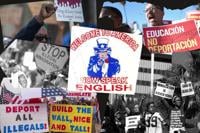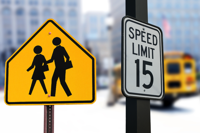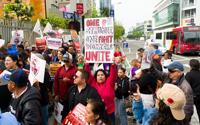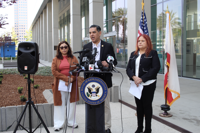
Illustration: Tevy Khou
This article was produced by Capital & Main. It is published here with permission.
In discussions about crises rooted in inequality — mass incarceration, criminal justice, housing — African Americans and Latinos have, over the last few decades, seemed to blur into a single sociological entity. From academics to activists, Black and brown are frequently discussed as one, subject to similar oppression and engaged in similar struggles for justice. But statistics alone — such as the fact that in 2023, the rate of poverty in California was highest amongst Latinos at 16.9%, followed closely by African Americans at 13.6% — were never enough to build unity or make common cause.
In California, that lack of unity is rarely discussed in the media, but is real on the ground. Many Black people have long been uneasy with how immigration has remade previously Black neighborhoods and cities; Latinos who continue to grow in number and political strength don’t always feel the need to include Black people in their progress. (That point was exposed in 2022 in a recording of a private meeting between several prominent Latino L.A. City Councilmembers and a union leader in which some dismissed alliances with Black communities as an impediment to their own power. The recording, which was peppered with anti-Black insults, went viral and became a symbol of behind-the-scenes interethnic tensions that plague liberal L.A. So much for solidarity.)
But the experiences of Black and brown people are starting to feel increasingly similar, not because of anything Black and brown people are doing, but because of what President Donald Trump is doing. In early March, Trump issued an executive order declaring English the country’s official language — the first time in history that our federal government has ever done so in what is widely regarded as a nation of immigrants.
Though cloaked in the rhetoric of national unity, it’s part and parcel of Trump’s war on immigrants, a war that has been prominently anti-Latino but that is also fundamentally anti-Black. (Remember that Trump built his political profile on a disinformation war on Obama, the first Black president, whom Trump falsely accused of not being born in America.)
The campaign against immigrants has always been a subset of the campaign to completely rid the nation of DEI — diversity, equity and inclusion — with Black and brown people being targeted as immigrants, the biggest beneficiaries of DEI or both.
The English-only order comes on the heels of a sweeping Department of Education memo in February to ban DEI initiatives in public schools, which are disproportionately populated by Black and brown students in large cities in states like California. Such efforts place Latino immigrants and African Americans in the same MAGA bucket — people who demographically threaten the well-being of white Americans and must be reined in.
The conflation of Black and brown as a single racial threat is something to be condemned. But the upside is that Black and brown people actually have something to unify about, at a moment when nonwhite people unifying against the rising anti-multicultural tide is critical. Such unity would be especially welcome in California, a blue, famously diverse state that has a long and troubled history with race.
In 1994, California voters passed ballot measure 187, sold as a “Save Our State” initiative that banned undocumented immigrants from public services, including education and health care. In 1998, Californians overwhelmingly passed another measure banning bilingual education — basically, teaching most courses in Spanish — in public schools. The first measure was eventually ruled unconstitutional; the second was overturned by voters in 2016. In between those votes, there was Proposition 209, a 1996 initiative that banned affirmative action in contracting and public university admissions. Black and Latino enrollment plummeted 40% at the University of California’s most prestigious campuses, UCLA and Berkeley, in the first year the ban took effect.
That law still stands, and it served as a model for a nationwide campaign — elevated by prominent Trump supporters — against affirmative action. That effort culminated in the 2023 Supreme Court ruling that effectively shut down affirmative action in colleges and universities nationwide.
The overarching broadside on diversity goes well beyond policy debates about affirmative action or public services; people of color are being constantly attacked and undermined for who and what they are.
For Black people whose families fled the South generations ago and settled in circumscribed neighborhoods like South Central Los Angeles, it can feel very familiar. English-only feels a lot like Jim Crow laws that for 100 years restricted racial access not just to white spaces, but to the whole notion of American belonging.
Belonging is what we truly mean when we push for equality and justice; it is what Black and brown people have fought similar battles to achieve for so long.
The battle has gotten serious, as we face off with nostalgics who believe that making America great again requires them to (once again) redefine American identity, i.e., to exclude us. They are trying to claim an absolute power to determine who belongs and who doesn’t, who is American and who isn’t. It is this power that the English-only decree seeks to shore up.
Retaining the power to dictate such things is a lofty ambition that can have immediate real-world consequences. For example, the federal government eliminating voting information in languages other than English will almost certainly further depress voting, an ongoing MAGA strategy in many states that doubtless had an impact on the November elections. But more than political, the English-only edict is also cultural: It rejects the relevance of all immigrants, regardless of their legal status or voting ability, to the American project of democracy and equality. It seeks to relegate them to as small a voice as possible.
Like many other large-scale anti-diversity moves, this seems destined for failure. You cannot contain something uncontainable. People speaking languages other than English is not some DEI program that can be defunded or eliminated, it’s how things are. The inevitability of diversity long represented by generations of post-Emancipation Black folks and fueled by waves of immigration is an American reality, and it has been for a long time. English-only is an attempt to socially engineer a monolingual, monoethnic state — a fake America that we’ve never had.
What’s next, taking down the Statue of Liberty? The lady in the New York harbor has long been synonymous with America and the idea that it welcomes immigrants and the less fortunate who are striving for a better life. It’s an idea that’s America’s brand, one that still defines America to much of the world. The transformation of immigrants from struggling outsiders to successful citizens is America’s most essential narrative, one that crosses party lines — think Andrew Carnegie, Frederick Douglass, even the fictional character Horatio Alger. Here in California there’s labor activist icon Cesar Chavez and former slave-turned-entrepreneur Biddy Mason — people who embody characteristics like hard work, innovation and determination to overcome are who we think of as quintessentially American.
Exclusivity can’t work for a nation of 340 million people who come from all across the globe and are versed in some 350 languages. Americanness is not a limited-edition sneaker drop, or a $5 million ‘gold card’ visa for wealthy foreigners proposed recently by Trump that would literally allow them to buy status. Americanness derives power from being aspired to, imagined and adopted by many, not from being hoarded by a few.
How ironic that in seeking to control the definition of Americanness, and access to all that entails, the president is promoting the very elitism he has decried among liberal elites, whom he claimed were ruining the country by overly accommodating racial change. But the push by Black and brown people for equality isn’t change; it is foundational to America. Our sometimes overlapping quest for justice is an intricately embedded (and ongoing) part of our country’s history.
But many Trump acolytes who reject this history don’t believe in the country at all. It may therefore be up to people of color to sustain that belief for all of us. Roman Palomares, head of the League of United Latin American Citizens, said in a response statement to Trump’s English-only order that it violates historical principles of equality that were revered, if not always practiced, by the country’s architects.
“Our Founding Fathers enshrined freedom of speech in the First Amendment without limiting it to one language,” Palomares declared. “They envisioned a nation where diversity of thought, culture, and expression would be its greatest strength.”
It’s a multicultural ideal that many Blacks and Latinos who have lived side by side in South Central L.A. for decades now would — despite their differences and distinct narratives — very likely agree with.











(0) comments
Welcome to the discussion.
Log In
Keep it Clean. Please avoid obscene, vulgar, lewd, racist or sexually-oriented language.
PLEASE TURN OFF YOUR CAPS LOCK.
Don't Threaten. Threats of harming another person will not be tolerated.
Be Truthful. Don't knowingly lie about anyone or anything.
Be Nice. No racism, sexism or any sort of -ism that is degrading to another person.
Be Proactive. Use the 'Report' link on each comment to let us know of abusive posts.
Share with Us. We'd love to hear eyewitness accounts, the history behind an article.